#cook:からあげ
Explore tagged Tumblr posts
Text

こふく:通称こふ、こふちゃん、稀にこふたん、こふたろう、こふくさん、別名脅威の黒猫
2022年7月、約2ヶ月半で保護施設から引き取られた。脱肛しており長くないかもと言われていたが、無事改善しすくすく育つ。
Jさんに日々挑みかかる強気な幼少期を送るも実は怖がりで、たまのお客さんはおろかじいちゃんにすら挨拶したことがない内弁慶。
だっこを嫌い、呼べば逃げ、最近は何を考えているか分からない顔で床に落ちており、家主ですら意思疎通は困難。しかし朝家主が目覚めると枕シェアによる寄り添いサービスを行っており、一定の愛情はあるもよう。
米をこよなく愛し、炊きたてご飯や準備中の餅米をむしゃむしゃと食べる。また物理的に我が道を行くため多くの物を壊し、実はかなり家主に散財させている���
Kofuku: known as Kofu, Kofu-chan, rarely Kofutan, Kofutaro,or Kofuku-san, and the alias is the black menace
He was adopted from the animal shelter when he was around 2months and a half. Although it was said he might not live so long because he had the anal prolapse, now he has no problems and has gotten so big.
He had a violent childhood attacking Mr.J every day, but his nature is only a home tiger so he can't greet with not only her guests but grandpa yet.
He hates being hugged, runs away when she calls him, and falls on the floor with the face that doesn't know what he's thinking these days, so it's still impossible for landlady to communicate with him. She can feel his affection only by his staying beside service with sharing her pillow when she wakes up.
He loves rice SO much and eats cooked rice or prepared mochi rice. And he always goes his way physically,then broke a lot of things at home so he let her spend quite an extra money...
5K notes
·
View notes
Text
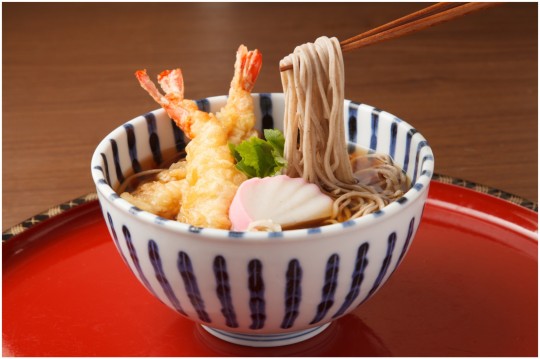
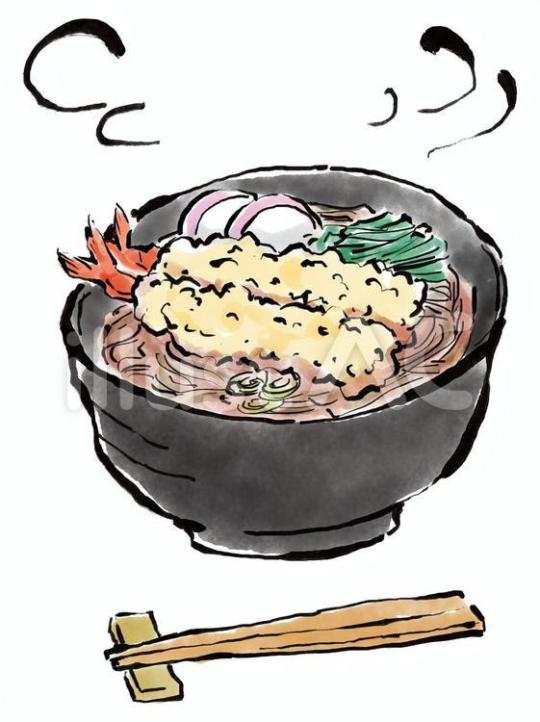
Sean bienvenidos a la última publicación del año hoy dia 31/12/2021 se come Toshikoshi soba, para despedir el año ¿Cuándo surgió ?y ¿por qué?. _ Ya durante el siglo V ya era bastante popular , se ha comido de formas distintas proviene del trigo sarraceno, se comía tal cual o se mezclaba con agua y luego se cocinaba lo más probable es que fuera introducido por china a través de Corea . - ¿Cómo se llamaba al plato popular del siglo V? soba-gaki y para beber soba-yu( este era más popular en el periodo edo para las enfermedades). El trigo sarraceno se hacía como unas albóndigas que después se comen hervidas, ¿Posible comida para ricos?. La soba como la conocemos data del periodo Edo hasta nuestros días siglo 16 año 1574 aproximadamente. - ¿Combinación con la temperatura? Se hizo popular por la misma época mencionada anteriormente, la soba tiene vitamina B1. - ¿Cocían este plato o su historia? espero que se lo pasen bien en la noche de nochevieja un cordial saludo. -
今日の最後の出版物へようこそ2021年12月31日大晦しそばが食べられて、今年に別れを告げます。それはいつ起こったのですか?そしてなぜですか? すでにV世紀の間にそれはすでに非常に人気があり、それはさまざまな方法で食べられました、それはそばから来ます、それはそのまま食べられるか、水と混合されてから調理されました、それは韓国を通して中国によって導入された可能性が高いです。 5世紀の人気料理は何と呼ばれていましたか? そばがきとそば湯を飲む(江戸時代は病気で人気がありました)。 そばはミートボールのように作られ、後で茹でて食べられます。 ご存知のそばは江戸時代から現在の16世紀、1574年頃までさかのぼります。 温度との組み合わせ? 上記と同時期に人気を博し、そばにはビタミンB1が含まれています。 彼らはこの料理またはその歴史を調理しましたか? 大晦日、心からのご挨拶をお楽しみください。 -
Welcome to the last publication of the year today 12/31/2021 Toshikoshi soba is eaten, to say goodbye to the year. When did it arise? And why ?. Already during the V century it was already quite popular, it has been eaten in different ways, it comes from buckwheat, it was eaten as it is or mixed with water and then cooked, it is most likely that it was introduced by China through Korea. What was the popular dish of the 5th century called? soba-gaki and to drink soba-yu (this was more popular in the Edo period for illnesses). Buckwheat was made like meatballs that are later eaten boiled. Possible food for the rich? Soba as we know it dates from the Edo period to the present day 16th century, approximately 1574. Combination with temperature? It became popular around the same time mentioned above, soba has vitamin B1. Did they cook this dish or its history? I hope you have a good time on New Years Eve, a cordial greeting.
55 notes
·
View notes
Text
食材の多い料理店
The Restaurant of Many Ingredients (Much Meat)
全身白髪だらけだと
As he strokes his red crest,
赤いとさかを撫でながら
Fry Kitchen grumbles that he's covered
フライ・キッチンがぼやく
Head to toe in white hairs
石臼での粉挽きなど
This is the first time in his life
生まれて初めて 昔は
That he's ever ground flour with a stone mortar
そんな身分じゃなかった
This hadn't been his standing in life in the past
.
屍用人に身を落としても
Though he'd stooped to the position of undead servant
家畜の姿に変わっても
Though his form had changed to that of livestock
意外と気分は悪くない
It actually isn't all that bad
今になって気がついたのさ
It was now that he realized
机に積まれた札束など
That stacks of money piled up on a desk
何の意味も無かったんだと
Don't really mean anything
.
肉の焦げた匂いが漂う
The smell of charred meat wafts through the air
次は自分じゃない事を祈る
He prays that he isn't next
.
ずっとうんざりしてたのさ
He'd always been so bored and fed up
23人の兄弟ども
So he finally bid farewell
ようやく別れを告げて
To his 23 siblings
ポーク・チョップは独立した
Pork Chop had set out on his own
嬉しい事のはずなのに
This should have been a happy thing
何故だか少し寂しい
But somehow it was a little lonesome
.
鼻を鳴らして野菜を切る
He cuts vegetables while snuffling and snorting
刃物の扱いは慣れたものさ
He's gotten used to holding a knife
何人も刻んできたから
Since he's chopped up countless people
希代の始末屋だったのに
He'd once been uncommonly stingy
今じゃのろまの従兄弟にさえも
But nowadays he can't even hold a candle
頭があがりゃしないのさ
To those blockhead cousins of his
.
熊の瞳がこっちを見ている
The bear's eyes are looking his way
獲物が自分じゃない事を祈る
He prays that he's not its prey
.
憧れのあの方にならば
Chateau Briand had declared that
食べられても構いませんわ
As long as it was by the one he admired
シャトー・ブリアンは言い切った
He wouldn't mind being eaten
あの日話しかけられなくて
He hadn't been able to speak to them that day
助ける事が出来なかった
And so couldn't save them
後悔は今も残る
His regrets linger even now
.
16人目のコックになる
He'd become the 16th cook
決意して門をたたいたけど
Though he had mustered his will and applied for an apprenticeship
既に屋敷はもぬけの殻
The mansion was already an empty husk
今ではもうあの時とは
And now everything
全てが変わってしまったけど
Is different from the way things were then
変わらないものだってあるの
Yet there are some things that haven't changed
.
けだるげな赤猫をみかける
He spies a listless looking red cat
自分のお腹の肉をなでる
It pats the meat of his belly
.
たどたどしい手つきの料理
I wordlessly gaze upon
行う弟子たちの姿を
The sight of my pupils
俺は無言で眺める
Carrying out their clumsy cooking technique
昔のことなど忘れた
I've forgotten most of my past
それでもこの調理場には
Even so, this kitchen
懐かしい匂いがする
Has a scent that brings back memories
.
誰かと旅をし料理をする
To go traveling with someone, and make food with them,
それがかつて自分が望んだ
Wasn't that the life that I had once
生活だったのだろうか
Wished to have?
店をにぎわす異界の客
These guests from the parallel world bustling through the restaurant,
彼らのために用意された
I reach for the new ingredient
新たな食材を手に取る
That I've prepared for them
.
幸せの花は赤く綺麗で
The flower of happiness is a lovely red
メインディッシュのスパイスに最適
It'll be a perfect spice for the main dish
.
再び弟子たちに目をやる
Again he looks towards his apprentices
選ばなければならない
He'll have to select
メインディッシュの食材を
The main ingredient for the main dish
不足で困る事は無い
He isn't lacking in choice
ここはとても食材の多い
This is Mister Dog's restaurant
ミスター・ドッグの料理店
Of many ingredients
30 notes
·
View notes
Text
Members of society in Japanese
A simple bilingual vocabulary list for words related to society.
Lista słówek: członkowie społeczeństwa w języku japońskim
赤ちゃん (あかちゃん) = baby; infant; niemowle; dziecko
お腹がすいたら、赤ちゃんは泣く。 When babies are hungry, they cry. Kiedy dzieci są głodne, to płaczą.
男 (おとこ) = man; mężczyzna
女 (おんな) = woman; kobieta
男 and 女 are casual forms 男の人 and 女の人 are formal/regular forms 男性 and 女性 are more formal and 'adult-like'
仕事好きな女の人もいるし、料理や洗濯が好きな男の人もいる。There are women who like working, and there are men who like cooking and doing the laundry. Są kobiety, które lubią pracować i są mężczyźni, którzy lubią gotować i prać.
王(おう) = king; król
王様(おうさま) (sonkeigo; honorifics)
彼らは王の殺害をたくらんでいる They are plotting to kill the king. Knują spisek, by zabić króla.
企む (たくらむ) = to plan; to scheme; to plot; knuć
殺害 (さつがい) = [noun] killing; murder; morderstwo
女王 (じょおう) = queen; królowa
王妃(おうひ) = empress; wife of a king; cesarzowa; żona króla
エリザベス女王2世 Queen Elizabeth II Królowa Elżbieta II
女王が国を支配する A queen rules a country. Królowa rządzi krajem.
支配(しはい) = [suru verb] rule; domination; rządzić
大統領 (だいとうりょう) = president (of a nation); prezydent kraju
大統領が重要な決定を下す The president makes important decisions. Prezydent podejmuje kluczowe decyzje.
重要 (じゅうよう) = [na-adj] important; ważny
決定を下す (けっていをくだす) = to make a decision; podejmować decyzję
隣人 (りんじん) = neighbor (document level formal); sąsiad
お隣さん (おとなりさん) = neighbor (everyday use)
近所さん(きんじょさん) = neighbor (formal)
だってお隣さんだし。ちょくちょくお邪魔するから。 Well, we’re neighbors. I’ll be popping over all the time. Jesteśmy sąsiadami. Będę wpadał cały czas.
お邪魔 (おじゃま) = [suru verb] hindrance; obstacle; to visit someone’s home; odwiedzać kogoś; przeszkoda
ちょくちょく = often, frequently; często
お隣さん is strictly neighbors on your right/left. 隣人 covers a circular area of effect, including nearest neighbors in all directions, in its meaning. 近所’s area of effect stretches more than the other two, is not limited to the nearest neighbors, and can include ones next to them.
女の子 (おんなこ) = girl; chłopiec
男の子 (おとここ) = boy; dziewczynka
女子 (じょし) = girl
少女 (しょうじょ) = young girl
少年 (しょうねん) = young boy
Awesome article related: https://www.japantimes.co.jp/life/2008/08/12/language/it-aint-too-bad-being-a-joshi-or-a-danshi/
子供(こども)= child; dziecko
子供のときに When I was a child... Kiedy byłem dzieckiem...
大人 (おとな) = adult; dorosły
成人 (せいじん) = adult; dorosły
成人 is a legal term and a person referred to as 成人 is over 20.
On a daily basis 大人 is used.
成人教育 Adult education Edukacja dorosłych
教育 (きょういく) = education; edukacja
人間 (にんげん) = human (≠ animal); człowiek
あの人は人間嫌いですか? Does that person hate people? Czy ta osoba nienawidzi ludzi?
人間嫌い (にんげんぎら) = misanthropy; misanthropist; mizantrop
友達(ともだち) = friend
Extra words: nakama | なかま | 仲間 “friend” (common in anime but uncommon in real life) shin'yuu | しんゆう | 親友 “close/best friend” tsure | つれ | 連れ “partner” (probably not in a romantic or sexual way) aibou | あいぼう| 相棒 “partner” (of a duo) shiriai | しりあい | 知り合い “acquaintance” chijin | ちじん | 知人 “acquaintance” doukyuusei | どうきゅうせい | 同級生 “classmate” douryou | どうりょう| 同僚 “colleague” dachi | ダチ “buddy” (slang way of saying friend) mabudachi | マブダチ “best bud” (slang way of saying close/best friend) yuujin | ゆうじん | 友人 “friend” (formal) kyuuchi | きゅうち | 旧知 “long[time] acquaintance” (source: quora)
7 notes
·
View notes
Text
Ikkiuchi - Lyrics + Translation (一騎打ち)
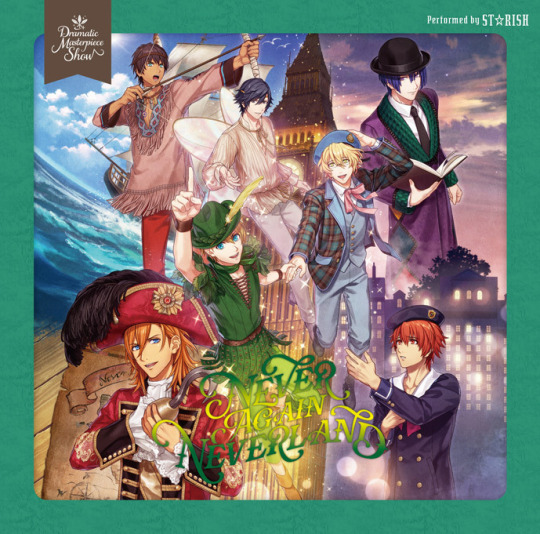
English title: One-on-one combat / Duel
Translator's notes can be found at the end and are marked with an asterisk.
Please do not repost/retranslate without permission.
Kanji:
【Re】 ヨーホー! ヨーホー!
誰もが恐れおののく 俺は海賊
このフックが調理してやろう
コックのように フルコース
味わわせてみせよう 華麗な技を
【Ce】 イーハー! イーハー!
誰よりも誇り高き ボクは戦士
このタイガー・リリーが戦いの喜びを教えてあげる
戦場を制するルーラー(支配者)
戦いのルールはボクさ
【Re】 笑わせるな
お前はルーザー 俺はクローザー
お前の命を終わらせる者
【Ce】 生きるか死ぬか 覚悟はできたか?
命が短いのはどちらの方?
【Re】 生意気な若造 世間を知らない
口先���かりで 恐怖も知らない
【Ce】 何を生き急ぐ? 驕り高ぶる大人よ
どうせ死にゆく定めなのに
【Re】 死なない人間などいない
時は誰しも平等で残酷なのさ
【Ce】 だからこそ譲れない
この身を賭した一撃は
【Re】 「やるな……」
【Ce】 「そちらこそ!」
【Re】 「さぁ、決着をつけよう!」
【Ce】 「望むところだ!」
【Re】 知らないがゆえに 壇上を舞う強さ
【Ce】 知っているゆえの 盤上の駆け引き
【Re・Ce】 讃えよ
重ね合う剣
【Re】花を散らして
【Ce】花を散らして
【Re・Ce】 海の藻屑となるがいい
Rōmaji:
【Re】 Yōhō! Yōhō!
Daremo ga osore ononoku ore wa kaizoku
Kono fukku ga chōri shite yarou
Kokku no yō ni furukōsu
Ajiwawa sete miseyou karei na waza o
【Ce】 Īhā! Īhā!
Dare yori mo hokori takaki boku wa senshi
Kono Taigā Rirī ga tatakai no yorokobi o oshieteageru
Senjō o seisuru rūrā
Tatakai no rūru wa boku sa
【Re】 Warawaseru na
Omae wa rūzā ore wa kurōzā
Omae no inochi o owaraseru mono
【Ce】 Ikiru ka shinu ka kakugo wa dekita ka?
Inochi ga mijikai no wa dochira no hou?
【Re】 Namaiki na wakazō seken o shiranai
Kuchisaki bakari de kyōfu mo shiranai
【Ce】 Nani o iki isogu? Ogori takaburu otona yo
Dōse shini yuku sadame na noni
【Re】 Shinanai ningen nado inai
Toki wa dare shimo byōdō de zankoku na no sa
【Ce】 Dakara koso yuzurenai
Kono mi o toshita ichigeki wa
【Re】 “Yaru na……”
【Ce】 “Sochira koso!”
【Re】 “Sā, ketchaku o tsukeyou!”
【Ce】 “Nozomu tokoro da!”
【Re】 Shiranai ga yue ni danjō o mau tsuyo-sa
【Ce】 Shitte iru yue no banjō no kakehiki
【Re・Ce】 Tataeyo kasaneau tsurugi
【Re】 Hana o chirashite
【Ce】 Hana o chirashite
【Re・Ce】 Umi no mokuzutonaru ga ī
Translation:
【Re】 Yo-ho! Yo-ho!
I am a pirate that makes everyone shake from fear
With this hook of mine, I’ll cook
A full course like a chef
I’ll give you a taste of my brilliant technique
【Ce】 Yee-ha! Yee-ha!
I am a warrior, prouder than anyone else
This Tiger Lily will teach you the joys of battle
I am the ruler who controls the battlefield,
The one who makes the rules of the battle is me
【Re】 Don’t make me laugh
You’re the loser, I am the closer*
Who will end your life
【Ce】 Are you ready to live or die?
Which of us shall have the shorter life?
【Re】 You’re an impertinent young lad, ignorant of the ways of the world
You’re all talk and no bite, and you don’t know terror
【Ce】 What’s the hurry? You’re an arrogant adult
Even though you’re doomed to die anyway
【Re】 There’s no such thing as a human who will never die
Time is equal and cruel to all
【Ce】 That’s why I won’t give up
The single blow I’m risking my life for
【Re】 “Not bad…”
【Ce】 “I could say the same.”
【Re】 “Now, let’s settle this!”
【Ce】 “That’s what I want!”
【Re】 The strength to dance on the stage because of ignorance
【Ce】 The ability to use tactics on the board because you know them
【Re・Ce】 Praise be
To the overlapping swords
【Re】 Let us fight fiercely
【Ce】 Let us fight fiercely
【Re・Ce】 Until one of us dies at sea
Translator's notes:
(クローザー) Closer- “In baseball, a closing pitcher, more frequently referred to as a closer, is a relief pitcher who specializes in getting the final outs in a close game when his team is leading.” [Wikipedia]
#uta no prince sama#utapri#translation#english#drama cd#otoya ittoki#masato hijirikawa#natsuki shinomiya#tokiya ichinose#ren jinguji#syo kurusu#cecil aijima#dramatic masterpiece show#nan#never again neverland
21 notes
·
View notes
Text
2024/11/30
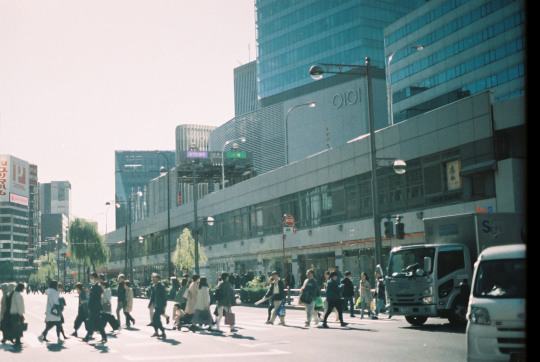
11月30日 吉祥寺で高校時代の友人とお茶をして、下北沢で永井さんの哲学対話に参加した日。 吉祥寺は相変わらずなぜか人が多かったけれど、井の頭沿線の風景を見ていると東京で働きたくなる。 哲学対話まで少し時間があったので、永福町で下車してそこから会場のボーナストラックまで歩いてみた。 立派な家がたくさんあった。 途中に前カゴに入れた荷物の重さにハンドルを奪われて車体が転がってしまった自転車のおばさんに出会い、車体を立ち上げるのを手伝った。 思ったよりも前カゴの荷物が重くて、手を貸したけれど全く役に立てなかった。思わず「うわっ、めっちゃ重いですね!」と言ってしまった。 すれ違ったもう1人の男性も手を貸してくれて、3人で(たぶんほぼ男性の1人の力で)車体を戻した。
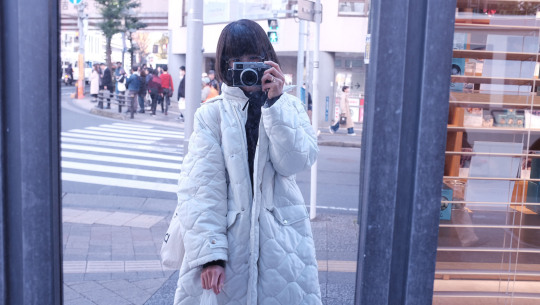
哲学対話は、モノにまつわるテーマを決めて、モノに物語を求めてしまうのはなんでだろう、と対話した。 今日一緒に対話した方々は、モノが好きな人が多かった気がする。物語のあるモノを、大切にしたいという気持ちを持っている人が多かった気がする。 わたしは、そもそもモノが苦手なのと、使い捨てのモノが好きだったり、捨てることで安心しているな、と改めて実感した。
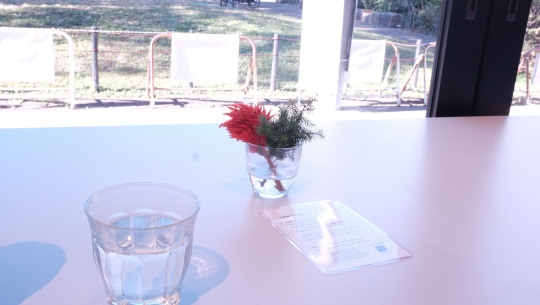
久しぶりに会った友人は、高校の先生をしている。私の8月までの出張先の町の高校に勤めていた時期があり、その時はお互いの勤務地の近くのデニーズでお茶をしたこともある。 私はその現場のお仕事を終えていて、友人はこの春に異動になり今は新しい学校に勤めている。 なので久しぶりにあったのだけれど、そうとは思えないく��い、近況から日常の話から、NHKの番組の話から、思い出話が一切ない楽しい話を何も気にせずたくさんさせてくれた。

高校時代からNHKの番組が大好きだった友人と、ドキュメント72時間の好きな回や、あまちゃんの楽しさを振り返った。1人で時を超えてあまロスしていたこともやっと人に話せた。
私は高校時代に出会った人で、今でも繋がりがあると思えるのは、今日あった友人ともう1人の位なので、漠然と「どうしてるかな〜」と思い出の人達の近況を、友人を通して確認できて、なんだかみんな元気そうだった。家庭を持って(家庭って何?!持ち物なの?)関東近郊に住んでいる傾向。

このままでいいのかな〜と死にたくなる日々に拍車がかかるかな、と思ったけれど、変わったけれど変わらない友人とたくさんお話しできて、今日のところは少し大丈夫だった。
坂口恭平さんの“cook”を読み始めて、まだ自分で料理はできないけれど、いつかやってみたいな、と思えた。やってみたい、と思えた。
哲学対話が終わった後、永井さんから本にサインをもらっている方が何人かいて、持ってくればよかった!!とちょっと後悔。次のイベントも参加したい、と、先々にしたいことを一つ増やすことができた。
今は、毎日今日で終わってしまいたい気持ちに、まだ続けた方がちょっとのマシが得られるかも、の予定を見つけたい日々。
今日は山口で住んでいた祖母のお誕生日。

3 notes
·
View notes
Text
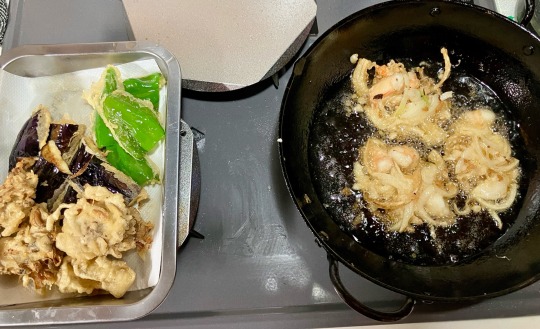
「てんぷら」 tempura
Let's try to talk about tempura in Japanese!
and cook TEMDON!
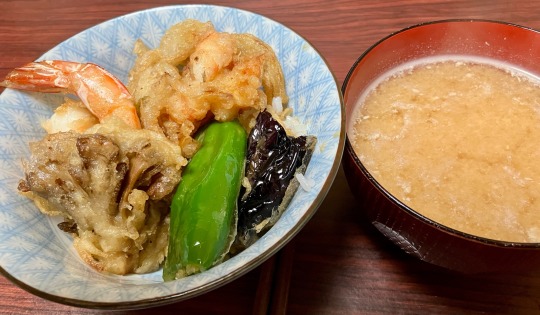
今夜は、天ぷらを 作りました。
つゆは、自家製 です!
こんや は、てんぷら を つくりました。
つゆ は、じかせい です!
I made tempura tonight.
The tsuyu is homemade!
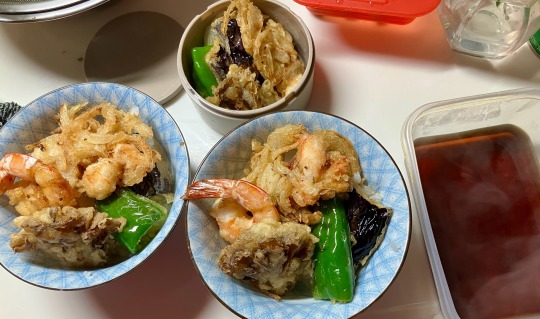
「天丼 てんどん TEN-DON (tempura bowl)」
茄子 なす eggplant
ピーマン ぴーまん green pepper
舞茸 まいたけ Maitake
海老 えび Shrimp
かき揚げ かきあげ kakiage
揚げる あげる deep fry
2 notes
·
View notes
Text
Ricola Herbal Candy (Essay)
Ricola Herbal Candy was once often seen in Japanese convenience stores, but it was replaced by throat lozenges made by Japanese companies and disappeared. However, at the end of 2024, I bought it because it was being sold in a new package at a drugstore.
This candy contains 13 types of herbal extracts, and I looked up their effects on the Internet. There were about two herbs that I didn't know why they were included, such as Lady's Mantle, which is effective against gynecological diseases. Still, most of them were confirmed to have effects against colds, such as cough suppressants, expectorants, fever reducer, and sweating.
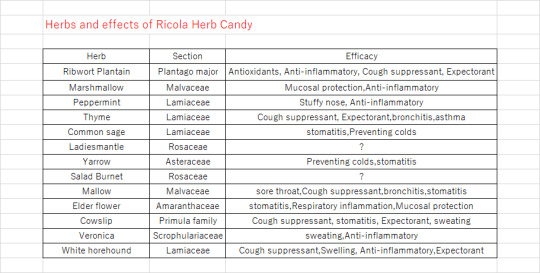
Of the 13 types, I have grown a horehound, and I know it is effective against cold symptoms. It is a reliable herbal candy.
(Horehound) In any case, it is bitter. That's why you can't use it in cooking. However, its bitterness is extremely effective in terms of its "cough suppressant" effect, and when I tried it before, it stopped my cough perfectly. The leaves are somewhat fruity, but that does not guarantee their sweetness.
The Japanese name is black horehound, but the name Horehound comes from the Old English har hune, meaning "downy plant."
1) Cultivation: Sunny, wind-protected, dry, alkaline soil is best.
2) Propagation: Sow in late spring, and take cuttings in late summer.
3) Harvesting: Harvest the leaves and flowering parts as needed from the flowering season.
4) Storage: Dry the leaves and flowering parts, or put them in syrup.
5) Medicinal: Drink the infusion. Mix six finely chopped leaves with a spoonful of honey, and eat slowly to soothe a sore throat or cough. Repeat six or seven times if necessary.
リコラ・ハーブキャンデー(エッセイ)
リコラ・ハーブキャンデーは一時期日本のコンビニでもよく見掛けたが、日本の会社ののど飴に駆逐され、姿を消した。だが2024年末、ドラッグストアで新包装のパッケージで売られていたので買ってみた。
このキャンデーにはハーブ抽出物13種が配合されていて、私はそれらの効能をインターネットで調べてみた��中には婦人病に特効のあるレディーズマントルなど、何故配合したのか解らないハーブも2種ほどあったが、大部分は鎮咳、去痰、解熱、発汗など風邪に効く効能が確認できた。
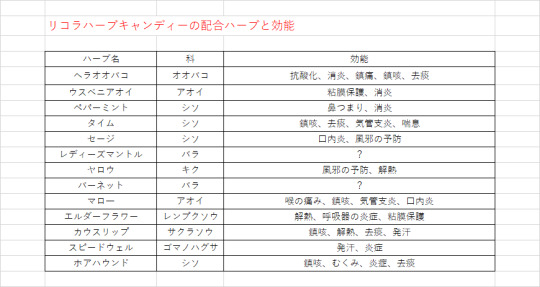
13種のうちホアハウンドは私も栽培したことがあり、風邪の症状に効くことは解っている。頼りになるハーブキャンデーである。
(ホアハウンド)兎に角、苦い。だから料理には使えないです。ただし、その苦さは「鎮咳(ちんがい:咳を止める)」効果のうえで卓効があり、私も以前試したところ、見事に咳は止まりました。葉には、幾分かのフルーティーさはありますが、それは葉の甘さを保障しないのです。

Horehound
クロニガハッカが和名ですが、ホアハウンド(Horehound)という名は古英語の「綿毛の生えた植物」=har huneからきています。
1)栽培 日当たりのよい、風を防げる、乾いた、アルカリ性の土壌が合う。 2)繁殖 春下旬に播種、夏の終わりに挿し木ができる。 3)収穫 開花期から必要に応じて葉や花のついた部分を収穫する。 4)保存 葉と花のついた部分を乾燥。またはシロップにつける。 5)薬用 浸出液を飲む。はちみつスプーン一杯分に6枚の葉を細かく刻んで混ぜ、のどの痛みや咳を和らげるためにゆっくり食べる。必要なら6,7回繰り返す。
2 notes
·
View notes
Text
2025年2月15日(土)

かつては落語を聴くのは夜というイメージだったが、近頃の私には夜遅くに電車に乗るのは辛いので、もっぱら昼間の会がありがたい。このところ、天満天神繁昌亭で開催される<月刊笑福亭たま>の朝席バージョンがお気に入りだ。10時開演、12時過ぎには終演、自宅に戻って少し遅めのランチ+🍷をいただくのが楽しみだ。次回のチケットも既に予約済、次々回も忘れずに予約しなくては。

5時45分起床。
洗濯開始。

朝食を頂く。
洗濯物を干す。
珈琲をいれる。
8時過ぎに家を出て天満天神繁昌亭へ、普段は阪急桂駅から乗車するが、バスの都合で西院駅から準急に乗って南森町駅へ。

今日の席は最前列、少し見上げねばならないが、前の席を気にしなくていいのは結構なこと。この会の楽しみは、たま師の一席目のマクラ、他では言えないことが聞けるのでいつも楽しみにしている。
終演後はまっすぐ帰宅、キャベツ���き(具のないお好み焼き)+🍷いただきながら録画番組鑑賞。
桂そうば「親子酒」
初回放送日:2025年2月15日 土曜の早朝は関西の笑いをたっぷりと!▽3月に「二代目桂惣兵衛」を襲名する桂そうばの落語「親子酒」▽らくご男子Vロケ企画第4弾・桂團治郎&桂あおばが千早赤阪村へ!
名探偵ポワロ
第1話「コックを捜せ」/ The Adventure of Clapham Cookシーズン 1, エピソード 1 ある朝、ヘイスティングスは新聞に掲載された事件をポワロに読んで聞かせるが、どれもポワロの興味を引かず、手持ちぶさた状態。そんな時、ポワロを尋ねて トッド夫人が事件捜査の依頼にやって来る。彼女は居なくなったコックのイライザを捜して欲しいと相談を持ちかける。渋るポワロだったが、依頼を引き受ける ことに。
彼女は買物へ、私は午睡。
夕飯は無水地鶏カレー、ストウブで野菜の無水煮を先ず作り、そこへ奥川ファームの地鶏もも肉をいれ、しばらくにてから肉をほぐして味付けする。前半は私の作業、後半の仕上げは彼女が得意。

息子たちにはスパークリングワイン、我々は🍶+🍷。
録画番組視聴、名探偵ポワロ。
第2話「���ューズ街の殺人」/ Murder in the Mewsシーズン 1, エピソード 2 300年続いている花火大会の夜、事件は起こる。その夜、ジャップ警部、ヘイスティングス、ポワロは夜空に上がる花火を見上げながら、こんな夜は殺人が起 きても銃声がかき消してしまうだろう、と話していた。翌朝、ポワロはジャップ警部からの電話で現場へ呼び出される。そこには、拳銃で頭を撃ちぬかれた女性 の遺体が!彼女は自殺か?他殺か?
第3話「ジョニー・ウェイバリー誘拐事件」/ The Adventure of Jonnie Waverlyシーズン 1, エピソード 3 ポワロは「金を払わなければ、明日12時、子供をさらう。」という脅迫文が届いた元大地主ウェイバリー氏から相談を受ける。脅迫はこれで2度目か3度目に なるという。ポワロはウェイバリー氏と共に、ジャップ警部のもとを訪れるが警部は本気で相手にしない。しかしポワロはこの事件の依頼を引き受ける。予告通 り、ジョニーが誘拐される。
片付け、入浴、体重は200g増。
パジャマに着替え、角ロック舐めながら日誌書く。

帰宅してから外に出ず、暖かかったので本当はウォーキングに出るべきだった。
3 notes
·
View notes
Text
Maomao no Hitorigoto Episode 6 : Things They Can’t Eat / 猫猫のひとりごと 第6話 『食べられないもの(Taberare-nai Mono)』
Please note that the English lines are just my translations.
猫猫「食べられない物…、毒見役をもすり抜ける毒になるということか…」
Maomao “Taberare-nai mono…, dokumi-yaku-omo suri-nukeru dokuni naruto iu-kotoka…”
Maomao “Things they can’t eat… It means they become poisons that can even pass through tasting for poisons...”
猫猫「ここで、猫猫の豆知識。『食べられないもの』以外でも、鮮度の落ちた魚を食べると蕁麻疹(じんましん)が出ることもあるらしい。異��がある場合、自己判断せずすぐに医者に診てもらうのが英断だろう」
Maomao “Kokode, Maomaono mame-chishiki. ‘Taberare-nai mono’igai-demo, sendono ochita sakana’o taberuto jin-mashinga deru-kotomo aru rashii. Ijoga aru baai, jiko-handan-sezu suguni ishani mite-morau-noga eidan daro.”
Maomao “Here’s Maomao’s bits of knowledge. In addition to ‘things they can’t eat’, it seems that eating stale fish can also cause hives. If you notice anything abnormal, it’s best to see a doctor right away rather than self-diagnosing.”
猫猫「しかし、なぜ里樹妃が狙われたんだ?…それにしても、美味しい毒だったなぁ…!」
Maomao “Shikashi, naze Rishu-higa nerawaretanda? …Soreni-shitemo, oishii doku dattanaa…!”
Maomao “But why was Concubine Lishu targeted? …Anyway, it was a delicious poison…!”
壬氏「…まだニヤニヤと…。全部吐き出し切れなかったか」
Jinshi “…Mada niya-niyato… Zenbu hakidashi-kire-nakattaka.”
Jinshi “…Still grinning… I guess she hasn’t gotten it all out yet.”
猫猫「ハッ!思えば、後宮に来て初めてありつけた毒だ。忘れないように…んんん…」
Maomao “Ha! Omoeba, kokyuni kite hajimete aritsuketa dokuda. Wasure-nai-yoni… Nnn…”
Maomao “Now that I think about it, this was the first poison I encountered since coming to the rear palace. I’ll try not to forget… Hmm…”
壬氏「もう一度、医務室に行くぞ。あっ…あ…誰にもらったんだ…!?…まさか、今ニヤけているのは…!」
Jinshi “Mo-ichido, imushitsuni ikuzo. A…A…Dareni morattanda…!? …Masaka, ima niyakete-iru-nowa…!”
Jinshi “We’re going to the medical room again. Ah…Who gave them to her…? Don’t tell me…the reason why she’s grinning right now is…!”
猫猫「んんん…変色や匂いは無かった…」
Maomao “Nnn… Henshokuya nioiwa nakatta…”
Maomao “Hmm… There was no discoloration or smell…”
壬氏「文(ふみ)か?誰かに���を書いているのか?」
Jinshi “Fumika? Darekani fumi’o kaite-iru-noka?”
Jinshi “A letter? Is she writing a letter to someone?”
猫猫「はぁぁ…そういえば、とても柔らかかったぁ」
Maomao “Haaa… So-ieba, totemo yawaraka-kattaa.”
Maomao “Ahh… Come to think of it, it was really soft.”
壬氏「や、柔らか…!い、一体、何の話を…!んんっ、んっ。んんっ、んっ」
Jinshi “Ya, Yawaraka…! I, Ittai, nanno hanashi’o…! Nn, N. Nn, N.”
Jinshi “S-Soft…! What on earth is she talking about…? Hmm, hmm. Hmm, hmm.”
猫猫「あ?何をされているのですか?」
Maomao “A? Nani’o sarete iruno-desuka?”
Maomao “What are you doing?”
壬氏「うっ」
Jinshi “U.”
Jinshi “Ugh.”
猫猫「次回、『里帰り』。李白様に急接近?」
Maomao “Jikai, ‘Sato-Gaeri.’ Rihaku-samani kyu-sekkin?”
Maomao “Next episode, ‘Homecoming.’ Suddenly getting closer to Master Lihaku?”
壬氏「今何て言った!?」
Jinshi “Ima nante itta!?”
Jinshi “What did you just say!?”
―――――――――――――――――――――――――――――――
医者に診てもらう(いしゃにみてもらう/Ishani mite-morau): see a doctor
<~してもらう: する(do) + もらう(get, to be given)>
In Japanese, we use “~してもらう” when we ask someone else to do something for us. This usage includes our appreciation to others who kindly take time and effort to do something for us, regardless of the fact that it’s their job or we’re paying for it.
Ex) 私は夕食を作るのを、母に手伝ってもらった。(わたしはゆうしょくをつくるのを、ははにてつだってもらった/Watashiwa yushoku’o tsukuruno’o, hahani tetsudatte-moratta.); I asked my mother to help me cook dinner.
(Strictly speaking, it’s not clear if I asked or not. Most likely I asked, but perhaps she helped me of her own will. Anyway what is important is that “~してもらう” has a meaning of appreciation for the kindness, and it’s completely different from “~させる” which means forcing someone to do something.)
<~してあげる: する(do) + あげる(give)>
On the contrary, when we do something for someone else, we can say “~してあげる”, but it’s a bit intrusive because it has the nuance of purposefully spending our time and effort on behalf of someone else and also expecting someone to thank us.
Ex) Shall I help you cook dinner?
Ex.1) 夕食を作るのを手伝ってあげようか?(ゆうしょくをつくるのをてつだってあげようか?/Yushoku’o tsukuruno’o tetsudatte ageyoka?) ←a little intrusive
Ex.2) 夕食を作るのを手伝おうか?(ゆうしょくをつくるのをてつだおうか?/Yushoku’o tsukuruno’o tetsudaoka?)←not intrusive, just trying to help someone.
<~してくれる: する(do) + くれる(give)>
There is one more word, “してくれる”. It means that someone do something for us, and the subject is someone, not us.
Ex) 母は私が夕食を作るのを手伝ってくれた。(はははわたしがゆうしょくをつくるのをてつだってくれた/Hahawa watashiga yushoku’o tsukuruno’o tetsudatte-kureta.); My mother helped me cook dinner. (In this case, it’s not clear if I asked my mother for a help, or she helped me of her own will.)
まさか(Masaka): No way, It can’t be…, Don’t tell me…, We say まさか… when something unbelievable or something we don’t want to happen is happening, or when we completely deny what we were told.
文(ふみ/Fumi): Old and classical way of saying “a letter”. Today, normally we call a letter “手紙(てがみ/tegami)”, and we read 文 as “bun” which means “sentences”.
アレルギー(Arerugī): allergy
Although we also use the same word “allergy”, our Japanese pronunciation is different and we may not understand if you say “allergy” with natural pronunciation of English.
If you are allergic to some foods and want to tell the staff at the restaurant in Japan, it’s the best to show some written text of “アレルギー(in Katakana)” and “the foods name(in Japanese)”, so that every Japanese can get it without fail.
#apothecary english#apothecary romaji#the apothecary diaries#apothecary diaries#learning japanese#薬屋のひとりごと#japanese#薬屋のひとりごと 英語#薬屋 英語 学習#japan
2 notes
·
View notes
Text
Finally, it's December.

It's cold, cold, cold! I am so bad at cold weather. The oil heater doesn't warm up the room at all (and the kerosene cost is very high), so we installed a wood stove. I asked a contractor I know well to install a wood stove in a room that requires a hole in the wall, and my husband's record store installed it ourselves. ↓It was very warm that day. He is my son.
あぁ寒い寒い寒い。私は寒さが大の苦手なのです。灯油ストーブでは埒が明かない。ということで薪ストーブを設置。壁に穴あけが必要な部屋はいつもお世話になっているガス屋さんに設置をお願い。 夫のレコード屋の方は自分たちで設置しました。 写真のこの日は暖かかったなぁ。


At first, we couldn't get used to using it and the room was full of smoke, but we gradually learned how to use it.
It's hard to chop firewood every day. It disappears in no time. However, the physical exertion of chopping wood warms me up before I turn on the stove. It also boils water. The ashes can be used as a substitute for abrasives and as fertilizer for the fields. It is also fun to think, "If I put the wood in this way, will it burn better? Inconvenient things are surprisingly convenient.
最初は使い方になれず煙もくもくだったりと苦戦しましたが、最近では料理やおやつまで。レモングラスの効いたカレーは大好物! 毎日の薪割りは大変だしあっという間になくなるし。 でも薪割りのおかげでストーブをつける前に体があったまる。お湯も沸かせる。そして日々、薪の置き方を変えてみたりと工夫も楽しい。不便は楽しい。

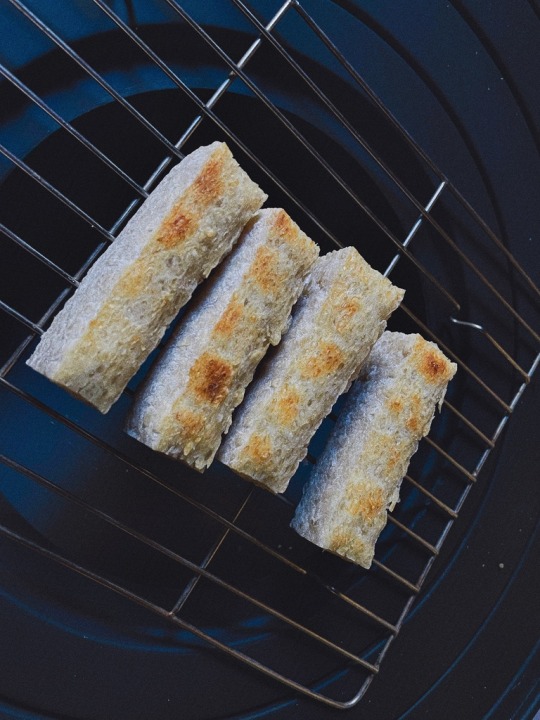

I can cook curry and bake snacks on the wood stove!
I have added more curtains to the front door where the drafts are coming in. I made them out of linen that I had dyed with persimmon astringent dye in the summer and an old Japanese check cloth about 100 years old. I will try to get through the winter with modest Christmas decorations with plants around our house.
隙間風が入ってくる玄関にはさらにカーテンを追加。夏のうちに柿渋染しておいたリネンに日本の100年ほど前のチェックの古布をで作りました。植物でさ��やかなクリスマスの飾り付けをしながら冬を乗り越えようと思います。
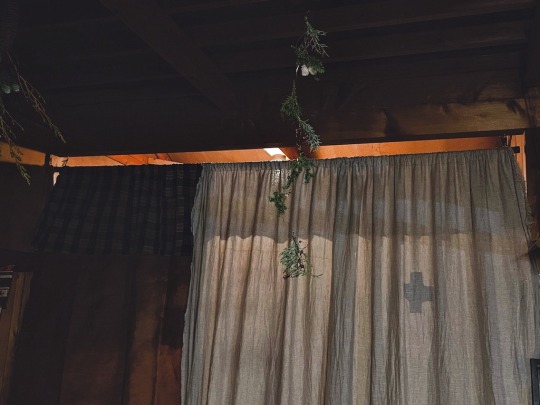

see you soon!
#country life#japan life#december#boro#japanese boro#japanese textile#christmas#wood stove#patchwork#sustainable#kakishibu
9 notes
·
View notes
Photo
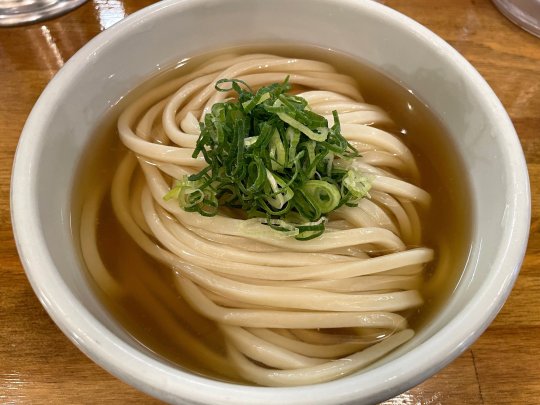
(Xユーザーの東山 広樹 | Cooking Maniacさん: 「香川のうどん再現度100% 飯田橋トーキョーサンフラワーはいいぞ… 僕は香川のうどんで育ったのですが… マジでリアル香川うどん!! 麺の表面の滑らかさがケタ違い!東京トップクラスだわ そして本物のコシがあるよ…噛みしめると小麦の甘さ���凄い いりこ出汁も完璧、天ぷらも揚げたて 絶対行くべき https://t.co/6hurnMWcy8」 / Twitterから)
6 notes
·
View notes
Quote
<11月4日>(月) 〇明日の選挙(日本時間では明後日)では、上下両院の議員選挙も行われる。さて、上院はどんな塩梅じゃ、ということで天気のいい日に外出もせずに、家でせっせと予習をいたすのである。 ●Senate Race 2024(ElectoralVote) ●Battle for the Senate 2024(RCP) ●2024 CPR Senate Race Rating(Cook) 〇それぞれに分析が違うので、一概には言えないけれども、とにかく面白い選挙区が少なくないのである。 *WV(ウェストヴァージニア州)は極度のレッドステーツ。そんな中で頑張ってきた民主党現職、ジョー・マンチンが引退を決めたので、共和党は置いてある饅頭を拾ってくるような楽な戦い。もうね、世論調査さえ行われていない。 *MT(モンタナ州)もレッドステーツ。そんな中で3期目を迎える民主党のジョン・テスター(D)はしぶとい現職だが、さすがに今年は苦しそう。挑戦者、共和党の実業家ティム・シーヒーがリードしていると伝えられるが、彼はメディアの取材を逃げまくっているとの噂もあって死角なしとせず。 *OH(オハイオ州)は急速に保守化しつつあるラストベルトの州。2年前には、あのJ.D.ヴァンスが現職ティム・ライアンを破って上院議員に当選している。今年、選挙を迎える民主党現職シャロッド・ブラウン(D)は州知事2期、上院3期のベテラン候補。共和党はここにトランプさんお気に入りの候補、元メルセデス・ベンツのディーラー、バーニー・モレノを投入する。接戦は必至。 *大統領選挙の主戦場となっているラストベルト3州は、いずれも上院選においても激戦区であり、民主党にとって守りの選挙となっている。WI(ウィスコンシン州)では現職タミー・ボールドウィンが3期目を目指すが、共和党は銀行家エリック・ホブデを投入する。MI(ミシガン州)では民主党現職が3期目72歳で引退し、民主党はエリッサ・スロットキン下院議員、共和党はマイク・ロジャーズ元下院議員を擁立している。そしてPA(ペンシルベニア州)は穏健派の民主党現職ボブ・ケーシーに対して、共和党が2年前には予備選でメフメト・オズ(懐かしい!)に敗れたデビッド・マコーミックをぶつける。3つともいい勝負になりそうだ。 *有名どころでは、MA(マサチューセッツ州)の現職、エリザベス・ウォーレン(75歳)やVT(ヴァーモント州)の現職、バーニー・サンダースお爺ちゃん(83歳)が再選出馬する。左派を代表する巨頭だから、選挙はテッパンでしょうな。しかし任期はあと6年ですぞ。こんな調子だから、上院議員はついつい高齢議員が多くなってしまうのです。 *それ以外の有名どころでは、MN(ミネソタ州)のエイミー・クロブチャ―(2020年の大統領選候補)、VA(ヴァージニア州)のティム・��イン(2016年のヒラリーの副大統領候補)、NY(ニューヨーク州)のカーステン・ジリブランドなどが再選を目指しています。いずれも難なく選挙は通るでしょう。 *AZ(アリゾナ州)は、ジョー・マンチンと並ぶ「困ったちゃん」現職議員のキルステン・キネマが今年限りで引退する。空いたところへ、民主党からはルーベン・ガレゴ下院議員が手を挙げて、共和党からはトランプ信者のカリ・レイクが挑戦する。ここは民主党がやや優勢か。 *NV(ネバダ州)は1期目の現職、民主党ジャッキー・ローゼンが楽勝で再選されるかと思ったら、ここへきて期日前投票は意外と共和党の出足が良い、てな報道があって冷や汗たらり。共和党の挑戦者は退役軍人のサム・ブラウンである。 *共和党の現職は、皆さんレッドステーツで安泰な選挙かと思ったら、TX(テキサス州)のテッド・クルーズ、FL(フロリダ州)のリック・スコットは意外な接戦となるかもしれない。いずれもキャラの立ったセネターですから、負けたら「いい気味」と言われてしまいそう。 *その他、NE(ネブラスカ州)では2つの選挙が行われる。いずれも現職は共和党で、補欠選挙のピート・リケッツ上院議員(知事による指名)はほぼ当確だが、本選挙のデブ・フィッシャーには若干のリスクがある模様。 *そうそう、CA(カリフォルニア州)では、生きていたら91歳という民主党現職の大物ダイアン・フェインスタインが死去した空席を誰が埋めるかという選挙で、アダム・シフ下院議員が昇格する見込み。これは同州では稀有のことでありまして、白人で男性であることは、かの州においてはハンディキャップ以外の何ものでもありませぬので。 〇今年の上院の改選議席は34ですので、上記で紹介した17議席のほかにさらに半分ある、ということです。とりあえず上の半分を押さえておけば、選挙速報を楽しむには不自由しないことでありましょう。どれ、お疲れさまである。
かんべえの不規則発言
1 note
·
View note
Text
シスタークラリスの奇妙な一夜
Sister Clarith's Curious Night (Nervous Night)
彼女がそのレストランを訪れたのは
She had visited this restaurant
行方不明の子供たちを探すためだった
To search for some missing children
噂を聞いたのだ
She had heard a rumor
孤児院の子がこの店に入っていくという
That the children of the orphanage had been seen
その姿を見たと
Entering this establishment
.
しかし応対した支配人の男は
But the manager who came to receive her
残念そうに首を横に振る
Regretfully shook his head
「そのような心当たりはありませんね」
"I wouldn't know anything about that"
それを聞いてがっくりと
Upon hearing that, the Sister
肩を落とすシスター
Dropped her shoulders, crestfallen
.
すると支配人は彼女を
When she did, the manager
レストランの一番良い席に座らせた
Ushered her over to sit in the best seat in the restaurant
「せっかくですから
"Since you're here
何か食べていってください
Please, have something to eat
......ああ お代なら結構ですから」
...Ah, it's on the house"
.
ありがたきお言葉
I'm quite grateful to hear that
実は昨日から
The truth is,
何も食べていません
I haven't eaten since yesterday
子供たちが心配で
Out of worry for the children
.
厚意に甘える事にしたシスターの前に
The Sister decided to presume upon his kindness
やがておいしそうな料理が運ばれてきた
And eventually she was brought a delicious-looking meal
白身魚のソテーだろうか それを見て
It looked like a sauteed white fish; when she saw it
彼女は申し訳なさそうに
She apologetically
うつむいてしまった
Cast her eyes down
.
「教えにより
"According to our teachings,
生き物の肉は口にできないのです」
I mustn't partake of the flesh of anything living."
シスターがそう断っても
Though the Sister demurred,
支配人は引き下がらない
The manager was persistent
「そんなことをおっしゃらず
"Now don't be that way,
ここは神の目も届かぬ森の中ですから」
The eyes of your god can't reach you here in the forest"
.
仕方なくシスターは
Reluctantly, the sister
ナイフで魚の身を切る
Cut into the fish's body with a knife
一口だけ食べて帰ろう
She'd just take one bite and head home
そんな風に考えていたところ
But as she was thinking this
彼女は料理の中に
She discovered that
何か固い物がある事に気が付いた
There was something hard inside the meal
.
シスターの顔が青ざめる
The Sister's face paled
それはレーナが身に着けていた
That was a brooch that Lena
ブローチだった
Had always worn on her person
泳ぐのが得意なレーナが
Lena was good at swimming, and
海で集めた小石を
She had made it herself
組み合わせて作った手作りの物だ
By joining together pebbles she'd gathered from the sea
.
どうしてこんな物が
What is something like this
料理の中にあるの?
Doing inside this dish?
少なくともあの子は
At the very least, that child
この場所に来ていた
Must have come to this place
.
ふと気が付くといつのまにか支配人の姿は
She suddenly noticed that the manager
店内のどこにも見えなくなっていた
Was nowhere to be seen inside the restaurant
胸騒ぎを覚えた彼女は思わず席を立ち
With a sense of unease she unthinkingly stood from her seat
店の奥へと忍び込んでいったのだ
And crept further into the back
.
途中の廊下で小さな靴が落ちていた
Partway through the hallway she found a small dropped shoe
シスターは再び青ざめる
The sister paled once again
それはマルクの靴だった
That was Mark's shoe
彼の足が速かったことを彼女は思い出す
She recalled that he'd been a fast runner
.
ひときわ異臭が漏れる扉の前に立ち
She stood before a door leaking a notably pungent odor
シスターは恐る恐るそれを押し開ける
The Sister timidly pushed it open
そこは血と肉のこびりついた調理場
Inside was a kitchen splattered with blood and meat
コックの顔をした男の顔は
The face of the man who looked to be the cook
毛むくじゃらだった
Was covered in thick fur
.
二本足で立つ
You, dog man who
犬の獣人よ
Stands on two legs
包丁についた血は
That blood on your kitchen knife
いったい誰の物?
Just who does it belong to?
.
作業台の上で赤い猫が
On the work counter, a red cat
皿のシチューを舐めている
Was licking up a bowl of stew
浮かんでいる具材は
The ingredients floating in it
間違いなく人間の指だ
Were, without a doubt, human fingers
無数の指の中の一つ
Among the countless fingers
そこにはめられた指輪を
The sister found one
シスターは見つけた
That was wearing a ring
.
あれはエマの物で間違いない
She was certain that it belonged to Emma
恐ろしい想像がシスターの脳裏を駆け巡る
A dreadful image flashed through the Sister's mind
振り返ったシスターの前に立っていたのは
When she turned around, standing before her were
二羽のウサギと巨大な熊だった
Two rabbits and an enormous bear
.
シスターは叫び声をあげ
The Sister let out a scream
その場に倒れこんだ
And collapsed on the spot
薄れゆく意識の中
In her fading consciousness
徐々に迫ってくる絶望の足音
Despairing footsteps steadily encroached on her
気を失う直前 彼女が見たのは
Right before she passed out, she saw
額に角を生やした少女の顔だった
The face of a girl with a horn on her forehead
.
目を覚ました時
When she awoke
彼女は孤児院に帰ってきていた
She had returned to the orphanage
そしてその後
And shortly after
行方不明の子供たちも全員
All of the missing children
無事に孤児院へ戻ってきたのだ
Safely came back as well
.
子供たちは数日間の記憶を失っており
The children had no memory of the past few days
そして とてもお腹を空かせていた
And they were very hungry
レーナやマルクたちが唯一覚えていたのは
The only thing Lena and Mark and the others could recall
フルートを持った
Was a pair of twin rabbits
双子のウサギの姿だけだった
Who had been holding a flute
.
あのレストランは建物ごと
That restaurant, and the building it was in
森の中から姿を消した
Vanished from the forest
まるで最初から
It was as though
存在していなかったかのように
It had never existed in the first place
そして
And
平穏な日常が戻る
Their peaceful days returned
.
子供たちのためにおやつの
While baking some brioche
ブリオッシュを焼きながら
For the children's' snack
シスターはこんなことを考えていた
The Sister began to wonder
.
もしもあの時
If, back then,
出された料理を口にしていたならば...
I had actually eaten any of the meal that had been set out...
私は一体どうなっていたのだろうか?
Just what in the world would have happened to me?
#()songs#()mothy#()E.A.T.#the thing you need to keep in mind is that most of this one is spoken and not sung#unfortunately the music is very good and a big part of it so you are missing out on that a little
58 notes
·
View notes
Text
Words from Nukoduke, vol. 4, part 4
Words in bold are particularly relevant to the story, and words in italics seem like they’d be worth remembering outside the context of the manga. Bold and italic together means they’ve probably appeared somewhere in Nukoduke more than once. Kinda long list but it’s for a whole volume… actually it’s too long for tumblr, so splitting into four parts.
供え物 そなえもの offering (e.g. to the gods), votive offering / ofrenda 誠実 せいじつ sincere, honest, faithful / sincero, honesto, fiel 重視 じゅうし regarding as important, attaching importance to, taking a serious view of, putting emphasis on / importancia 作務衣 さむえ, さむい samue, monk's working clothes 匂わせる, 臭わせる におわせる to give off (a smell, scent, aroma), to smell of, to perfume (a room, etc.), to hint at, to suggest, to insinuate 天然 てんねん nature, spontaneity, natural airhead / natural (belleza, gas) 未亡人 みぼうじん widow / viuda 純文学 じゅんぶんがく pure literature, belles-lettres 茶葉 ちゃば tea leaf, tea leaves ようやっと finally, at last, at length, barely, narrowly, hardly, only just 威圧感 いあつかん intimidating air, sense of intimidation 人望 じんぼう popularity 嬉々, 嬉嬉, 喜々, 喜喜 きき merry, joyful, gleeful / contento, satisfecho, alegre 引っかく, 引っ掻く, 引掻く ひっかく to scratch, to claw / arañar, rascar, rasguñar 野性 やせい wildness (plants, animals, etc.), uncouth, rough, unpolished / silvestre, salvaje 看板娘 かんばんむすめ pretty girl who attracts customers to come inside a shop ぴちぴち, ピチピチ bursting with youth and energy (esp. young woman), vivaciously young, spunky, energetic, (fish) jumping around energetically (e.g. when caught in a net), bursting (e.g. seams), tight, splattering (e.g. cooking oil) 男勝り, 男まさり おとこまさり (of a woman) strong-minded, spirited, mannish / (de una mujer) mentalidad fuerte, animada, hombruna 舎弟 しゃてい one's younger brother, underling (e.g. in yakuza), junior male peer, sworn younger brother 寡黙 かもく untalkative, quiet, taciturn, reticent, uncommunicative / callado, tímido 女房 にょうぼう, にょうぼ, にゅうぼう wife (esp. one's own wife), court lady, female court attache, woman who served at the imperial palace, woman (esp. as a love interest) / esposa 僭越ながら せんえつながら by your leave, with your permission ちまちま small, compact 狭き門 せまきもん the strait gate (in the Bible), the narrow gate, high barrier (to enter a highly competitive school, company, etc.), difficult hurdle, difficulty, obstacle ひた隠し, 直隠し ひたかくし hiding at all costs, desperate cover-up, doing one's best to keep (something) secret ひた隠す, 直隠す, ヒタ隠す ひたかくす, ヒタかくす to cover, to cover up 独学 どくがく self-education, self-instruction, self-study / estudiar de modo autodidacta, autoaprendizaje 快諾 かいだく ready consent 厳格 げんかく strict, severe, stern, rigid, rigorous, tough / serio, duro, severo, inflexible, rigor, austeridad 涙腺 るいせん tear gland, lacrimal gland 資格 しかく qualifications, requirements, capabilities / calificaciones, requerimientos, capacidades 暴挙 ぼうきょ violence, reckless action, (an) outrage 古株 ふるかぶ old-timer, veteran, senior, old stump, old roots 息抜き いきぬき taking a breather, relaxation, vent hole 吹き出す, 噴き出す, 吹きだす, 吹出す, 噴出す, 噴きだす ふきだす to spout out, to spurt out, to gush out, to jet out, to sprout, to bud, to burst into laughter, to blow (smoke, etc.), to send out shoots (of a tree) / brotar, soplar hacia afuera, empezar a soplar 実体験 じったいけん real experience, actual observations 天才肌 てんさいはだ (person) seeming like a genius, (having) the temperament of a prodigy 急ぎ足, 急足 いそぎあし fast pace, quick pace
#these are almost all from the author's note#this one's all about how the author became a mangaka it's very sweet#Nukoduke#vol 4 part 4#vocab#Japanese in manga#I think vol 4 is when it starts to really get good (at least when I started to get more attached to it)
5 notes
·
View notes
Photo

ほうとう 北陸の郷土料理
ほうとうは、富山県を中心とする北陸地方の郷土料理で、太めの麺と野菜を具材とした鍋料理です。富山県の代表的な料理として知られています。 ほうとうの特徴は、太めの平打ち麺を使い、一口大に切った野菜や豆腐などと一緒に鍋で煮込むことです。主に使われる具材は、キャベツやネギ、大根、こんにゃく、そして味噌ベースのスープが特徴的です。味噌をベースにした出汁で調理され、野菜や麺がスープの風味を吸収し、深い味わいを持ちます。 一般的なほうとうの作り方は次の通りです: 1. 具材の準備 野菜(キャベツ、大根、ネギなど)、豆腐、こんにゃく、麩(ふ)、そしてほうとう用の太めの平打ち麺を用意します。 2. スープの作成 味噌や出汁、醤油、みりんなどを使って、味噌ベースのスープを作ります。地域によって、使用される味噌や調味料は異なる場合があります。 3. 煮込み 野菜や豆腐、こんにゃく、麩、ほうとうをスープに入れ、一緒に煮込みます。具材がスープの風味を吸収し、柔らかくなるまで煮込みます。 4. 仕上げ 具材が柔らかくなり、麺がスープを吸い込んだら、器に盛り付けます。最後に、お好みで刻みネギや唐辛子などをトッピングすることがあります。 ほうとうは、野菜と麺がたっぷり入った栄養豊かな料理であり、地元の人々や観光客に親しまれています。富山県を訪れた際には、地域の味を楽しむためにぜひ試してみてください。
✄🔪🥄🍽✄🔪🥄🍽✄🔪🥄🍽✄🔪🥄🍽
Hoto Local cuisine of Hokuriku
Hoto is a local dish of the Hokuriku region, centered on Toyama Prefecture, and is a hotpot dish made with thick noodles and vegetables. It is known as a representative dish of Toyama Prefecture. The characteristic of hoto is that it uses thick, flat noodles and is simmered in a pot with vegetables and tofu cut into bite-sized pieces. The main ingredients used are cabbage, green onions, daikon radish, konnyaku, and a miso-based soup. Cooked in a miso-based soup stock, the vegetables and noodles absorb the flavor of the soup, giving it a deep flavor. A typical way to make hotou is as follows: 1. Preparation of ingredients Prepare vegetables (cabbage, radish, green onion, etc.), tofu, konnyaku, fu (fu), and thick flat noodles for hotou. 2. Creating the soup Make a miso-based soup using miso, dashi, soy sauce, mirin, etc. The miso and seasonings used may vary depending on the region. 3. Stew Vegetables, tofu, konjac, gluten, and hoto are added to the soup and simmered together. Simmer until the ingredients absorb the flavors of the soup and become soft. 4. Finishing Once the ingredients are soft and the noodles have soaked up the soup, it's time to serve. Finally, you may add toppings such as chopped green onions or chili peppers if you like. Hoto is a nutritious dish packed with vegetables and noodles, and is a favorite among locals and tourists alike. When you visit Toyama Prefecture, be sure to try it to enjoy the local flavor.
3 notes
·
View notes